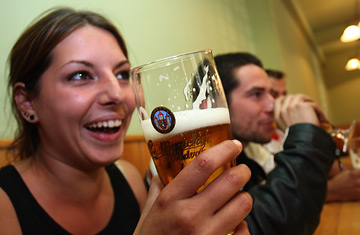
Johana Stejskalova drinking Budvar beer in a pub in Ceske Budejovice.
Those were eight tough years when Vaclav Moravec had no choice but to live in the Czech city of Pilsen, the cradle of the famed pilsner beer. That's because for more than 40 years, the 65-year-old retired engineer has been a daily patron of Budweiser — not that pale thirst-quencher produced by Anheuser-Busch, but the hearty, bitter lager from the small Budejovicky Budvar brewery in the South Bohemian town of Ceske Budejovice. The town's German name, Budweis, gave both beers their name — and cause for their nearly century-long trademark war in courts worldwide. "Every time I arrived in Budejovice I first hurried to a pub," Moravec says as he recalls his grim years in Pilsen.
Now, Moravec faces a new ordeal: Recent Czech press reports allege that Anheuser-Busch had been in talks with a close, though unofficial, adviser to the Czech Prime Minister about buying the last major post-communist brewery still in state hands — which also happened to be the Czech namesake of its flagship brand. "The truth is that I would have to quit drinking beer altogether," Moravec grunts at the prospect of a new owner tampering with the Budvar magic. "Better that than to drink some slop."
Beer has been brewed in this county capital of 95,000 since the middle ages, and the Budejovicky Budvar brewery was founded in 1895. The company was nationalized after World War II, but has kept producing a premium brew from first-rate water, malt and hops that to this day matures for three months in white lagering tanks in the brewery's chilly cellars. "It is a symbol of Budejovice," says 20-year-old resident Johana Stejskalova when asked what Budvar means to her.
Moravec is not the only denizen of Ceske Budejovice who fears for the fate of the town's favorite tipple if it were snatched up by Anheuser-Busch. Many locals, like Moravec, believe that the U.S. brewing giant wants Budvar only for its trademarks, and might even shut the brewery down. Jan Vesely, the head of the Czech Beer and Malt Association industry group, dismisses such worries, saying "I don't know of any brewery in Central Europe someone would buy to close."
The trademark tug-of-war certainly intensified a decade ago when, in the aftermath of the fall of Czechoslovakian communism, Anheuser-Busch failed in its bid to buy Budvar. In more than 100 court cases and administrative proceedings worldwide, Budvar and Anheuser-Busch have tangled over which brewer gets to call its suds Budweiser. (Through the outcome of an agreement earlier in the century, Budvar beer sold in North America, for example, is called Czechvar. In much of Europe, the Anheuser-Busch brand is marketed as Bud).
Rumors of the secret talks sent beverage industry speculation into high gear, although government and company officials rushed to deny there were any talks at all. Key government ministers have suggested publicly that they would like to sell off the government-owned brewer, but that privatization is not around the corner.
And even if Budvar does go up for grabs, says CEO Jiri Bocek, Anheuser-Busch would not be given preferential treatment over any other bidder. In January, the rivals announced a deal under which Anheuser-Busch would import and distribute Budvar's Czechvar beer in the United States. Rumors immediately swirled that the American brewer was trying to get ahead of potential bidders in a future privatization. But Bocek rejects those claims. He says that when Anheuser-Busch CEO August Busch IV made him the surprise distribution-deal offer in a meeting in Prague, they agreed, he says, "that the only people who are enjoying our lawsuits are the lawyers." But he also insists that they agreed on nothing more than a distribution deal. "We are not in talks with any potential partners," he says.
That may help calm those locals who subscribe to an anyone-but-Anheuser mentality, believing it would be an insult for their illustrious brew to be owned by what they consider a pretender to the Budweiser name. "It would be a smack in the face," scoffs retired car repairman Milos Homolka, 54. "Americans would still make beer, but it will not be the good old Budvar." Not that it would really affect Homolka either way. He has already switched to pilsner.
